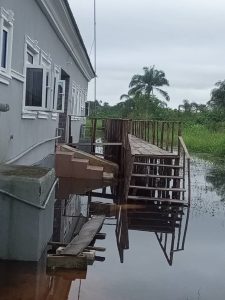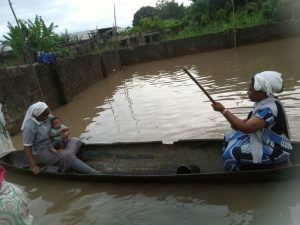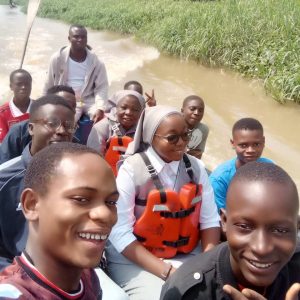Torugbene
Torugbene is in the Catholic diocese of Bomadi in Delta State of Nigeria. It is a village in the creeks of the Niger Delta. Fishing is a great occupation here. The people do bits of farming wherever they can find a piece of land.
During the rainy season, the roads are quite challenging with potholes filled with water that one stops to think of where to put the tires of the vehicle so as not to get stuck on the road, or where to put one’s foot on plywood or jumping from one steppingstone to another used to navigate the muddy and slippery road or footpaths. Although the road (not tarmacked) from Bomadi to Torugbene is completed, you can only drive to a primary school field and park your vehicle before trekking the rest of the way to your house. One essential commodity here is gumboots! The stranger needs a walking stick (or the hand of a resident) for support to navigate the roads.
There is one major road that runs through the market. Others are pathways to homes, private schools and churches in Torugbene which are not suitable for cars. The people use tricycles and motorbikes where it is possible to do so. Otherwise, they trek. The Sisters have a boat funded by a donor agency and it is used for the outreach programme to villages in the creeks. There is no electricity in Torugbene except a few scattered solar panels mounted by the government at some strategic points. The people who can afford them have small generators. The Sister’s house and clinic are surrounded by water with fish, tall grass, croaking frogs especially at night, two churches and mosquitoes! Living and ministering here is a great adventure in faith.
A section of the land on which the MMM house is built has been sand-filled and this enabled them to build what is known as a ‘Monkey Bridge’ with plywood starting from the beginning of our house to the clinic. The Sisters, staff, and the sick use this bridge to reach the clinic. I understand from one of the sisters that the monkey is skillful in its movement and hardly falls off from any height so, humans have to be careful walking on it irrespective of how narrow it is. However, the bridge is wider these days because of visitors for whom it might be their first time to walk on such a creation.
The front of the clinic facing the major road from Bomadi to Torugbene is water-logged with tall grass as you will see in the picture below. This will be another important route to the clinic for clients from neighbouring villages but it has to be sand-filled, a culvert built and two pavements constructed for use by pedestrians, motorbike, tri-cycle and vehicles to access the clinic by neighbouring villages. On one occasion, a very sick patient was brought in by canoe and they made their way through the water covered by grass.
The Sisters do antenatal care, outpatients, and outreach. The six prevalent diseases in the area are Malaria; Typhoid; Diarrhoea; Malnutrition; Measles and Skin infections. There is a great need to do an aggressive campaign about immunisation because they have lost people in the community to Tuberculosis and other contagious but preventable diseases.



The difficulties and challenges:
• It is quite a distance from Torugbene to towns for businesses such as banking, purchasing of drugs, and going to their nearest community which is in Benin City. They need a vehicle e.g. Hilux because of the bad roads.
• Teenage pregnancies and school dropouts are challenges among the youth.
• It is difficult to get professional health personnel and staff to work in the creeks.
• The economic situation of the country is affecting the people badly and they cannot afford their bills even though it isn’t much.
• The clinic is surrounded by water, and it is difficult for the patients to access the clinic.
• We cannot store vaccines at the clinic due to a lack of electricity and insufficient sunlight to charge the solar batteries. The batteries are also in need of replacement. Proposals were written for Solar batteries and activities like outreach etc. One Funding Agency has given USD25,000. Another proposal has been submitted for Euro 45,000. Still awaiting a response. There will still be a shortfall as the total cost is Euro 103,625. It is costing more because of the terrain.
• The front of the clinic needs to be sand-filled to create easy access to more people and a proper estimate for the work will be done during the dry season.
The Christmas Craft Fair proceeds are going towards this project.
